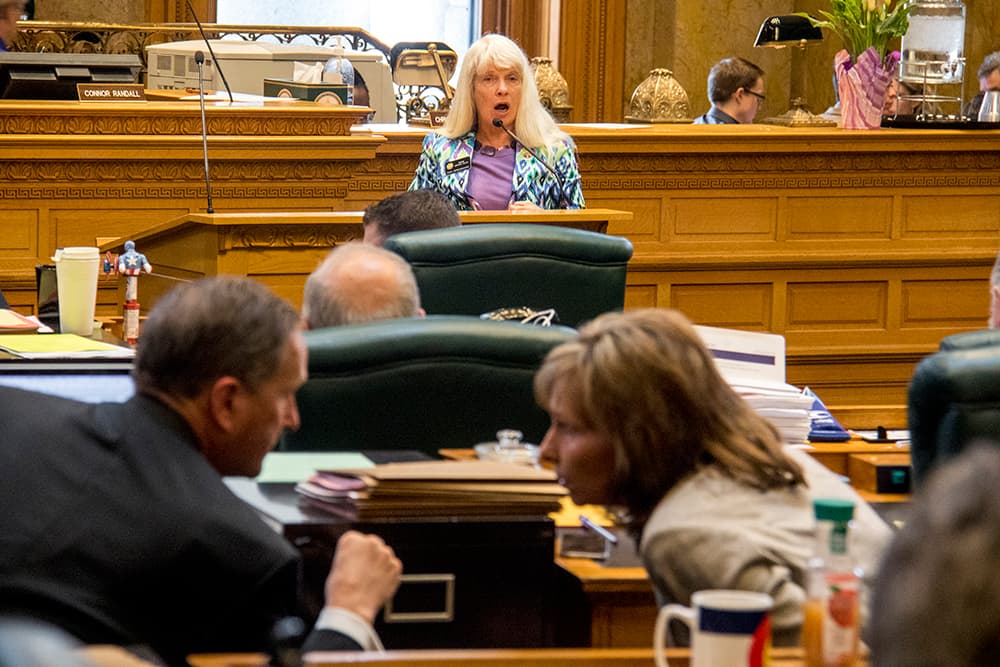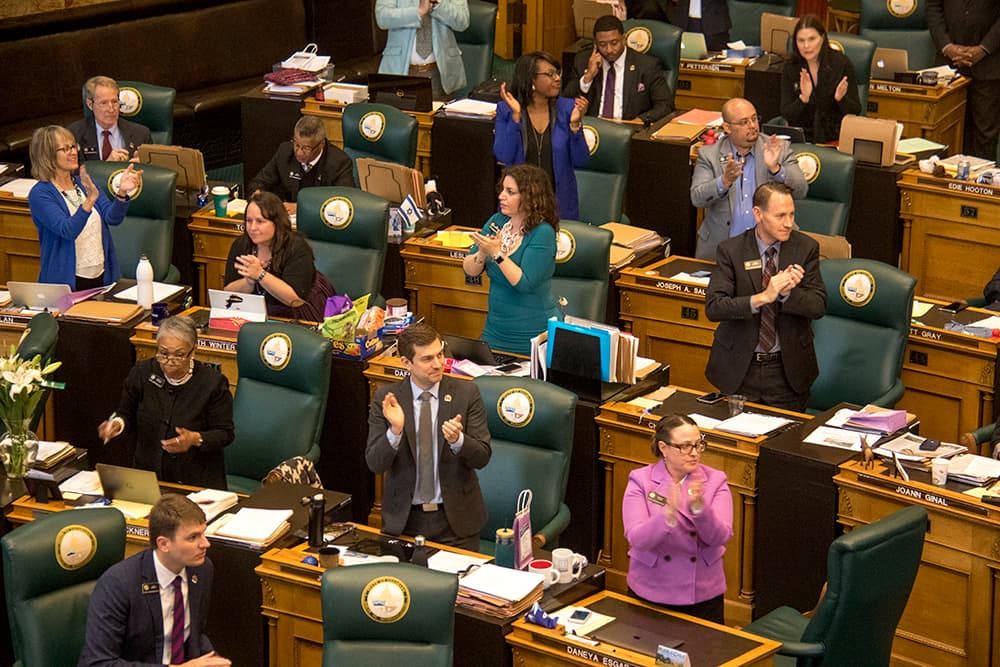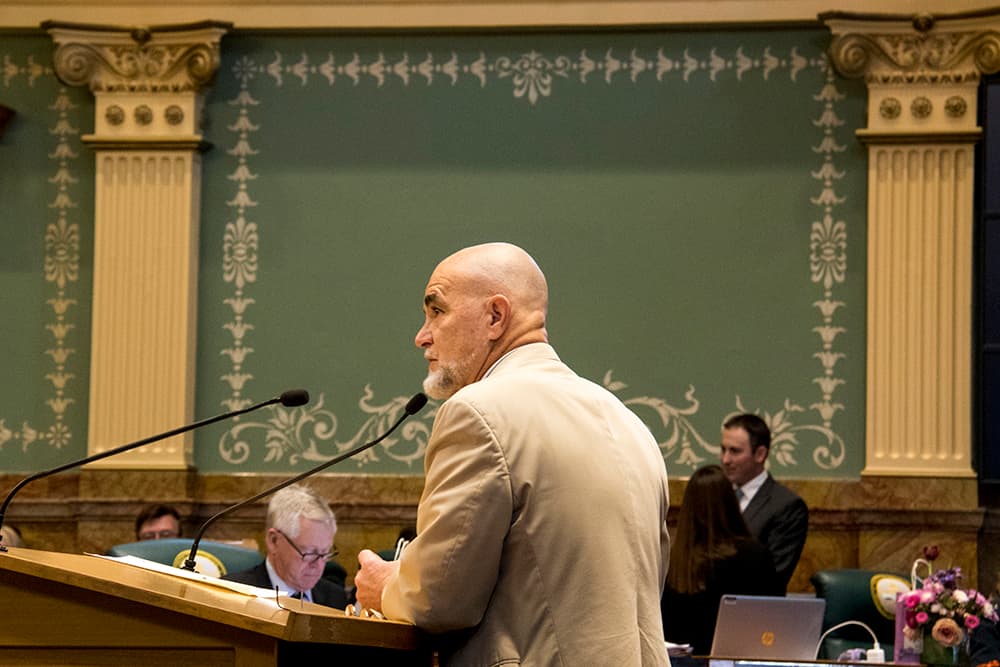
Most called it a compromise, one lawmaker called it a casserole -- and it's on its way the governor's desk. (Update: Gov. John Hickenlooper signed the bill May 30.)
On the last day of the session, the Colorado House voted 49-16, with significant Republican support, for a bill some lawmakers found hard to swallow but that a majority nonetheless saw as nutritious enough to be worth taking a bite. Hey, some people like casserole!
SB17-267, Sustainability of Rural Colorado, has been widely described as the most significant bill of the 2017 session, and it does a whole bunch of things that are very hard to fit into a headline.
Here are the highlights:
- Reclassifies the hospital provider fee into an enterprise fund. This separates it from the rest of the budget and protects hospital funding this year and in the future. It also frees up hundreds of millions of dollars in the rest of the budget.
- Reduces the revenue cap that governs the rest of the budget by $200 million. This is the trade-off for putting the fee into an enterprise, but it’s a much smaller reduction than many Republicans wanted.
- Funds a $1.8 billion roads program and a $120 million capital construction program by selling certificates of participation on state property. This is a debt mechanism that doesn’t require voter approval, and it obligates the state to pay $100 million in general fund money and $50 million in Highway User Tax Fund money each year to pay off that debt.
- Requires state departments to submit budget requests next year that are 2 percent smaller than this year.
- Raises marijuana retail sales taxes to the maximum 15 percent authorized by voters.
- Increases Medicaid co-pays for some patients.
- Dedicates $30 million for rural schools and an additional $29 million from marijuana tax money for the education fund.
- Increases the business personal property tax exemption to $18,000.
- Protects the senior homestead tax exemption and lets it be used as the first refund in years when the state owes taxpayers a refund under TABOR.

If this bill hadn't passed, hospitals would have faced major cuts.
The budget bill approved by both chambers earlier this session included a $264 million reduction in the hospital provider fee. That would have amounted to a $528 million cut to hospitals -- with rural hospitals particularly hard hit -- because the money from a 6 percent fee on patient revenue is matched by federal dollars.
The reason the money was being cut in the first place is that the hospital provider fee revenue had caused the state budget to grow so much that it was bumping up against the revenue cap imposed by the Taxpayer's Bill of Rights, and writing a refund check to taxpayers would have required cuts to other programs.
Democrats tried and failed in 2015 and 2016 to move the hospital provider fee into an enterprise fund, which exempts it from TABOR. This year, as many as 12 rural hospitals, many in districts represented by Republicans, faced potential closure due to the loss of funding. This impending crisis brought folks to the table who could not find agreement in years past.
The Colorado Hospital Association heaped praise on the bill's sponsors -- Republicans Sen. Jerry Sonnenberg and Rep. John Becker, both from northeast Colorado, and Democrats Senate Minority Leader Lucia Guzman of Denver and House Majority Leader K.C. Becker of Boulder -- and called the process a model for the state and the nation.
"By separating this money from the general fund, Colorado hospitals will have stability and reliability in funding that wasn’t possible as the state balanced its budget each year," association CEO and President Steve Summer said in a statement.
"This will allow hospitals to return to longer-term strategic planning for the health and health care in their communities. This is crucial as hospitals face uncertain times due to changes in funding for health care at the federal level."

Future budgets will look different because of this bill.
A fiscal analysis predicts that hundreds of millions of dollars will be freed up under the revenue cap. The state will also be obligated to spend more general fund money on roads than in past years. And every place the government is obligated to spend money means less discretion in the rest of the budget.
State departments won't necessarily see uniform 2 percent cuts. They have to propose smaller budgets, but the legislature still controls allocations. Ideally, at least as envisioned in the bill, those 2 percent cuts help make room for the larger obligation for roads. And the $2o0 million reduction in the revenue cap means the base from which future budgets can grow is now that much smaller.
The arguments against the bill were legal and fiscal.
Rep. Tim Leonard, an Evergreen Republican, questioned the constitutionality of the proposal because it reduces the revenue cap by much less than will be removed to create the provider fee enterprise fund. He also questioned how so many different issues could fit under one bill title. Colorado law discourages these types of omnibus bills.
"Members, we work for the people," Leonard said. "We work for the taxpayers. We work for the voters. We do not work for all the recipients of government money waiting for the troughs to fill up. ... This bill log rolls all these concepts together with the purpose of forcing our hand to vote."
But other Republicans said it was those people, those voters, who compelled them to vote yes.
Rep. Jim Wilson, a Salida Republican, said all the talk of rural Colorado was music to his ears. He's the one who called the bill a casserole, full of leftover legislative ideas from this session and sessions past that will only get nastier if they sit another year.
"I vote my conscience first, my constituents second and my caucus third," he said. "This is a conscience and a constituent issue. ... Yesterday is dead and gone, and tomorrow is out of sight. Today is the last day we can make a difference on hospitals, roads, bridges -- they’re all in there."
John Becker, the Republican co-sponsor, put a more positive framing on those leftovers.
"These are not things that showed up in this bill because they popped out of the clear blue," he said. "These are all things we spoke about in committee and from the floor. ... These are your ideas. This is your bill."
K.C. Becker, the majority leader, described a tantrum her young son had recently over something he didn't want to eat. When she dug down into the matter, she realized he wanted "everything he wants and nothing he doesn't want."
"We’re not five-year-olds in the legislature," Becker said.
Nobody likes everything in the bill -- some think the marijuana taxes are too high and were never meant to offset business tax exemptions, others want to wait on a ballot measure to more fully fund transportation, still others wish government were cut more -- but the bill solves a pressing problem that cannot be ignored, she said. This was a compromise worked out only last week and introduced as an extensive re-write on Friday, with four days left in the session, but that's what it took to get the deal done.
"I stand strongly behind the work we’ve done to solve problems and bring people on board," she said.
Rep. Diane Mitsch Bush, a Steamboat Springs Democrat who saw the transportation bill she sponsored this session die in a Republican-controlled Senate committee, said the needs of rural Colorado on transportation, education and health care unite the disparate provisions of the bill, and those needs matter to the entire state.
"In the end, we are here to help our constituents," she said. "We’re here to look at complex, difficult problems and sometimes to look at the intersection of those complex, difficult problems. This bill does just that. It pulls together the three key issues facing rural Colorado, and yes, all of Colorado."
Yum?











